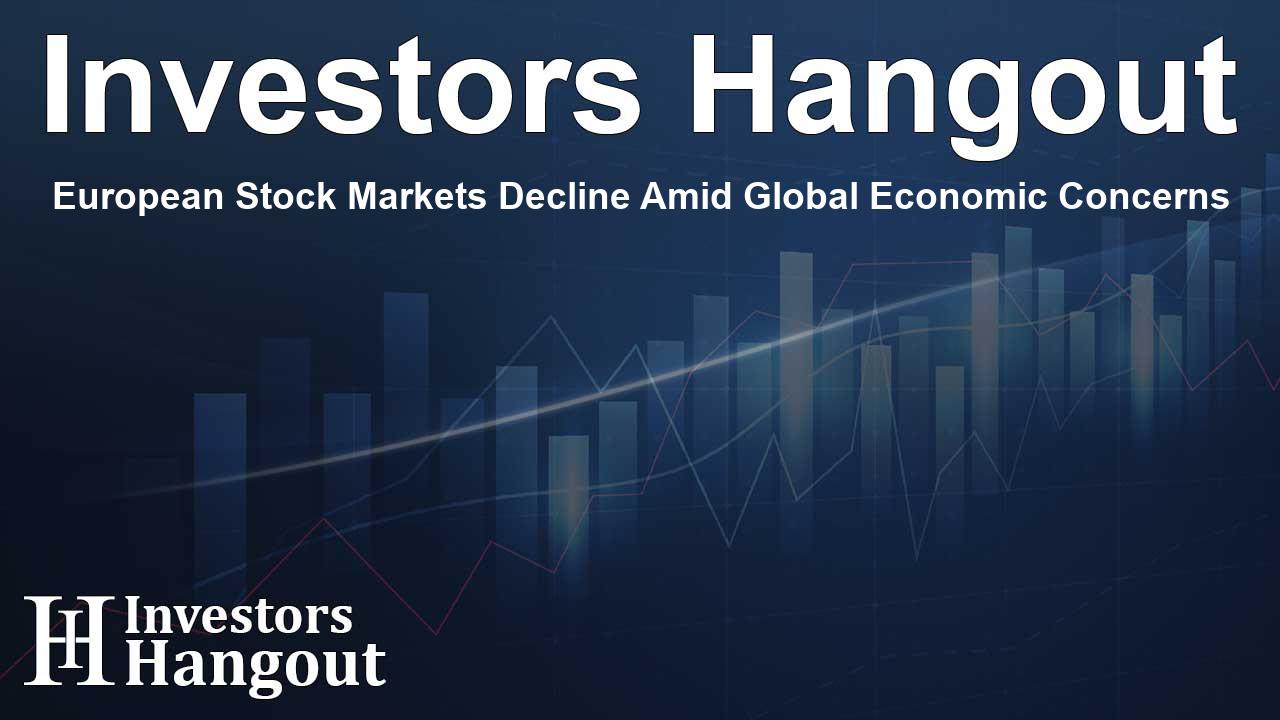European Stock Markets Decline Amid Global Economic Concerns

Market Trends in European Stock Markets
European stock markets took a downturn recently as they mirrored the retreat seen on Wall Street. Investors are currently reassessing the trajectory of interest rates in the United States, alongside growing concerns about the ongoing conflict in the Middle East and weaknesses in regional economies.
Wall Street’s Impact on European Indices
The leading European stock indices faced a weak opening, influenced by lackluster performance from Wall Street on the previous trading day. Traders took note of last week’s robust jobs report in the US, which led them to dismiss the likelihood of an aggressive rate cut by the Federal Reserve at its upcoming meeting. Due to this shift in sentiment, European markets are adjusting to a cautious outlook.
Additionally, the re-opening of Chinese markets after a week-long holiday also disappointed investors. Initial gains were swiftly moderated due to the absence of immediate stimulus measures from Beijing’s policymakers, despite prior anticipation for additional support.
Insights on German Industrial Production
In Europe, the economic landscape appeared mixed as economic reports trickled in. German industrial production saw an unexpected rise of 2.9% for August, surpassing the anticipated increase of 0.8%. However, it’s noteworthy that this figure still reflected a decrease of 2.5% year-over-year.
This news followed a grim report indicating a significant decline of 5.8% in German factory orders month-over-month, as well as modest retail sales growth of just 0.2% within the Eurozone for August. This backdrop puts pressure on the European Central Bank, which is slated to meet next week, with expectations leaning toward further easing of monetary policy as inflationary pressures subside.
Oil Prices React Following Recent Peaks
Meanwhile, oil prices experienced a decline as traders began to take profits after a robust rally prompted by fears regarding possible disruptions in oil supply due to escalating tensions in the Middle East. A notable drop occurred in the price of Brent crude, which fell by 1.5% to $79.72 per barrel. Concurrently, U.S. crude futures (WTI) also dipped by 1.5%, settling at $75.95 per barrel.
Prior to this retreat, both oil contracts had surged more than 3% on Monday, achieving their height since late August, alongside an impressive weekly gain of 8% — marking the largest increase in over a year.
Looking ahead, analysts anticipate the release of the latest U.S. crude oil inventory data from the American Petroleum Institute. Expectations are set for inventories to increase by approximately 1.9 million barrels, further informing trader sentiment and market dynamics.
Investor Sentiment in a Fluctuating Market
With overarching themes of inflationary concerns, monetary policy adjustments, and geopolitical tensions playing out in global markets, investor sentiment remains cautious yet alert. Analysts and market participants are closely monitoring central bank communications and economic indicators that could influence policy direction. Furthermore, the interaction between European economic data and the wider global market trends will continue to shape investment strategies.
Frequently Asked Questions
1. What are the main reasons for the decline in European stocks?
The decline in European stocks is primarily driven by weakness on Wall Street, reassessment of US interest rates, and regional economic concerns.
2. How did Wall Street influence European markets?
Wall Street's recent underperformance led European traders to adopt a more cautious outlook, particularly amid changing expectations for US Federal Reserve interest rate decisions.
3. What indicators showed the state of the German economy?
German industrial production rose unexpectedly by 2.9% in August, though factory orders dropped by 5.8% month-over-month, indicating mixed economic signals.
4. What is the outlook for oil prices in light of current events?
Oil prices recently dipped as traders collected profits after a rally driven by Middle Eastern conflicts, but remain sensitive to geopolitical developments and inventory news.
5. How might the European Central Bank respond to current economic conditions?
The European Central Bank is expected to ease policy further in response to easing inflationary pressures and weak economic growth projections in Germany.
About Investors Hangout
Investors Hangout is a leading online stock forum for financial discussion and learning, offering a wide range of free tools and resources. It draws in traders of all levels, who exchange market knowledge, investigate trading tactics, and keep an eye on industry developments in real time. Featuring financial articles, stock message boards, quotes, charts, company profiles, and live news updates. Through cooperative learning and a wealth of informational resources, it helps users from novices creating their first portfolios to experts honing their techniques. Join Investors Hangout today: https://investorshangout.com/
Disclaimer: The content of this article is solely for general informational purposes only; it does not represent legal, financial, or investment advice. Investors Hangout does not offer financial advice; the author is not a licensed financial advisor. Consult a qualified advisor before making any financial or investment decisions based on this article. The author's interpretation of publicly available data shapes the opinions presented here; as a result, they should not be taken as advice to purchase, sell, or hold any securities mentioned or any other investments. The author does not guarantee the accuracy, completeness, or timeliness of any material, providing it "as is." Information and market conditions may change; past performance is not indicative of future outcomes. If any of the material offered here is inaccurate, please contact us for corrections.